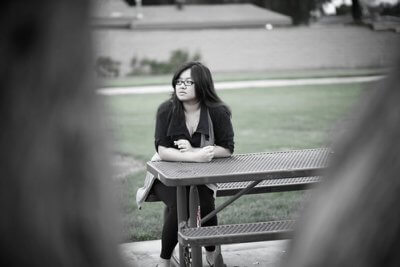“Why Don’t People Like Me?” (And What to Do if This Is You)

By: Sodanie Chea
by Andrea M. Darcy
Always secretly wondering, “Why don’t people like me?” Feel lonely when you are with your so-called ‘friends’? Or actually struggle to make any friends at all?
“Why don’t people like me”?
What are the deeper reasons that people just don’t like you back? And what can you do about it?
1.You haven’t asked this crucial question.
Here’s the thing – do you, deep down, actually like other people? Or do you secretly find them all disappointing or even boring?
If you often go on rants about how pathetic people can be, or endlessly criticise and complain about others behind their back? It is simply not an attractive energy. Even the people you aren’t moaning about can back away.
To be liked by people, we need to like people. We need to put effort into noticing what is worthy about other people, in recognising their strengths, respecting their efforts, and showing them compassion.
2. “Why don’t people like me? I don’t like myself”.
Well yes…. and no.
It’s ideal to like ourselves all the time, but also pretty unrealistic. Most people have days of self doubt and being hard on themselves. And we absolutely don’t have to like ourselves all the time to have good friends.
Self-love is a big ask, so try to accept yourself instead. How could you show yourself more compassion? What three things did you do today that you can be proud of? What is right about you? Focus on that.
3. Your target is completely off.
Always trying to be liked by people who are popular, who you think look good, or who you are sure have more interesting lives than you?
Do they share your personal values? If so, they’d probably naturally gravitate towards you. Shared values magnetise people together, and is the glue behind healthy, happy relationships.
If you value loyalty and kindness, and that popular fellow student or colleague values excitement and winning? Even if they finally did like you, you might not want to be their friend after all when the buzz of acceptance wears off.
Work to recognise your own values, then find people who share them. You are far more likely to then end up with friendships that you feel happy in.
4. You lost yourself along the way.
Are you constantly morphing what you say and do, and things like the way you dress, to match and impress others?
People don’t actually want to be pleased or impressed. They want to feel comfortable and safe. If you are constantly changing, it can overwhelm others. The more secure you are in who you are, the more others can relax around you.
Some of us are naturally more flexible people than others, and it’s normal as we get older to change our taste in things like music and food.
But you do need to know what truly matters to you, what your boundaries are, and what you think and feel.
If these things are hard, if your childhood has left you so used to pleasing others you’ve lost yourself along the way, put some effort in. Try journaling and mindfulness, or speak to a counsellor.
5. You never learned to listen.
Do you talk about yourself in order to show people how likeable you are? Or complain and moan in an attempt to seem interesting? Never stop talking in your attempt to hide anxiety and seem funny?
Oversharing is actually a turn-off and can be misconstrued as selfishness.
Listening, on the other hand, helps others feel connected to and valued, which we all deep down want. It’s just that many of us weren’t raised learning how to do it, with our own parents not listening to us.
Read about listening techniques and get practicing. You’ll find that people are more interesting than you realised, and that they are interested in you without you having to brag or bully.
6. You are overvaluing the love of others.
No matter who likes or doesn’t like you, you are still you. Nobody’s love can save you from yourself, not even the biggest romance of your life.
The only saviour here is the person looking back at you in the mirror. Get to work taking care of him or her and making yourself happy. Putting pressure on others to do that for you? It scares people off.
Find things that make you feel good, even if others around you don’t get it. If you love flying kites, then get into flying kites. The happier you are with what you are doing, the more you feel at home in your skin, the more others will be attracted to you. And the more you’ll naturally meet people you have things in common with.
7. You might actually think and behave in different ways than most people.

By: Son of Groucho
Some of us actually do come across as unlikeable despite best efforts.
This happens because the way that you see yourself, others, and the world is different than the average because of Asperger’s syndrome or a personality disorder.
It’s like you are speaking Chinese and everyone is speaking English – they simply don’t understand you right away. They need you to explain to them how you actually think and feel.
If you think this might be you, then go talk to a mental health professional and get some tests done. It’s not about getting a label, it’s about learning how to relate to other people in ways they will understand, and how to help others understand you.
8. It’s simply paranoia (with good reason, though).
All the above aside, the most common reason we think people don’t like us is that we are not seeing reality clearly. They do like us, but we have blinders on.
Either poor parenting, difficult past experiences, or childhood trauma has left you with the hidden idea that you are simply unloveable.
How can you think other people like you if there is a little voice whispering in your unconscious that you are not good enough? And you mistake this voice for ‘the truth’?
9. You aren’t letting them like you.
If you are secretly terrified of intimacy? Of letting other people know the real you? No wonder people seem like they don’t like you. You’ll be dodging and sabotaging all their efforts no matter how hard they try, and turning it all on them.
Time to start letting people like you? Or want to know if a personality disorder or autism is stopping your social life? We connect you with top London psychotherapists in central London. Or use our booking site to find UK-wide talk therapists or online counsellors.
 Andrea M. Darcy is a health and wellbeing expert, who has done some training in person-centred counselling and coaching. She often writes about trauma, relationships, and ADHD, and advises people on how to plan their therapy journey. Find her on Instagram @am_darcy
Andrea M. Darcy is a health and wellbeing expert, who has done some training in person-centred counselling and coaching. She often writes about trauma, relationships, and ADHD, and advises people on how to plan their therapy journey. Find her on Instagram @am_darcy






I became friends with someone at my church who a few months ago. We clicked straightaway and went on a few trips together as we have similar interests. We also had several meals together and messaged each other most days. However, he is going through a divorce and also he seemed to change personality a few weeks ago. He then said I was too intense and wanted a 2 week friendship break. After that I found out he had blocked me. A close friend of mine who I’ve known for years saw how distressed I was about the situation and rang this guy who said he had got a lot on with his divorce and a very ill family member and he could no longer be friends with me. I do have other close friends but I am distraught and finding it hard to deal with. It’s very difficult as we see each other at church but he completely ignores me and my wife said it was blatant and obvious. I am trying to move on but it’s so upsetting that I am struggling. I worry thatni must be so off-putting for this guy to end out friendship like this
This year, I met a woman and we became really good friends throughout the year and we ended up getting physically close a few times. We were quite comfortable together and a good fit in my eyes but she started becaming distant and just wants to be friends but I’ve ended up falling for her at the same time. I’m struggling with the rejection but want to remain a good friend to her. How can I go about this as my confidence has taken a huge knock and I just feel anxious and emotional these past few weeks and just want it to stop. Appreciate any good advice.
Thank you.